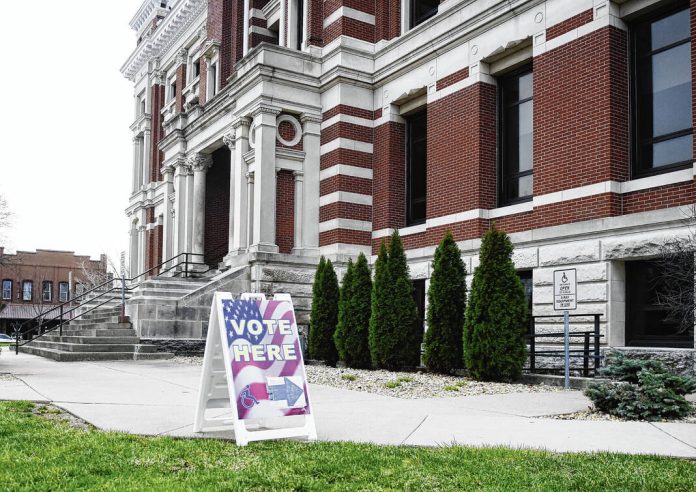Shannon Samson’s angels of democracy reported for duty Thursday evening in t-shirts and in cufflinks. They wielded purses, pens and Pepsi bottles.
One by one, a dozen veteran vote center inspectors and a pair of newbie clerks pushed past the clear double doors to the Marion County Election Board’s service center and traipsed left into a low-ceilinged, windowless training room.
They — some retired, some fresh off work — eased into beige folding chairs at pale folding tables piled with chartreuse cases of electronic poll-books.
As Samson reviewed key legal requirements and common voter blunders, they followed, thumbing through folders of election forms and stapled Election Day guides.
Indiana needs thousands of poll workers to staff its more than 5,000 precincts, according to a January 2024 pamphlet from the Indiana Secretary of State’s Office detailing how to sign up. Poll workers earn up to $150 for their service, depending on the county.
Inspectors work 12-plus-hour shifts on Election Day, in addition to time spent training or picking up materials; clerks can work 6-hour shifts. They earn modest stipends.
Election workers check in registered voters, provide them with ballots, assist them with equipment and monitor the voting process, among other responsibilities.
Some keep coming back to the service center, year after year.
“It’s hard, but things that are meaningful often are,” Samson said. As a project manager for the election board, she prepares vote center staff guide materials and leads training sessions.
Inspectors brushed off the difficulties.
“I was always taught that part of being an American is participating: not just going out to vote, but being there to make sure that the voting is fair and everything’s done as legally as it’s supposed to,” Inspector Carina McDowell said.
McDowell, a Democrat, said she got her start working the polls as a sheriff in the ’80s. An election sheriff, not one that arrests people.
“I’ve just pretty routinely worked polls. And at one point, one of the inspectors told me that I should become a Republican so I could be an inspector, because I knew the inspector’s job better (than some in the role),” she said. “But it turns out I didn’t have to change. So I became an inspector.”
The Indiana Democratic and Republican parties can appoint election workers to poll locations or vote centers, but county election boards can fill vacancies with interested Hoosiers unaffiliated with either party.
All must take an oath to uphold the constitutions for the United States and the state of Indiana, in addition to other legal requirements.
McDowell said she was “actually pretty confident” in Indiana’s elections because she’d seen “almost no issues” in her decades of working the polls.
Inspector Robert Hailey’s faith in Hoosier elections stemmed from his detailed understanding of the procedures behind them.
“I know what we do,” said Hailey, who works elections independently of the two major parties.
“All the processes in place (are there) to protect your vote,” he added.
Hailey, a mortgage banker, takes Election Day off to lead his vote center. But, like at his day job, he takes pride in providing a “great experience” on Election Day to voters. He considers them external clients.
“(You want) someone that, if you have an issue, is knowledgeable to get you through the process, to resolve the concerns you have and (to) educate you more,” he said. “… You’ll understand where you are, what’s going on and why something can or cannot be done.”
But he also emphasized the internal client: his election clerks.
“My poll workers, they want to follow me around. ‘Where you at this year, where you at?’” Hailey said. “I get them in and out. I make sure we have no issues: no paper issues, no ballot inconsistencies.”
Samson said the election board is typically short of vote center staffers. Board employees call up past workers and ask them to return, or “beg” clerks to move up to inspector roles.
She tries to make training fun — joking around with her veterans, answering their elaborate scenario questions — and the job approachable.
“This is really something you could do to contribute to democracy,” Samson said.
Some are insistent on fulfilling their roles.
One inspector, leaning on a cane, said she’d injured an ankle and hit her head in a fall last month. But she’d man her vote center on Election Day, whether on foot or sitting down with an ice pack.
“I’m so glad you still chose to serve,” Samson said.
The response was quick, almost reflexive: “I have to.”
To check your registration status, see who is on your ballot and find your polling location, visit IndianaVoters.com.
Keep up with the Capital Chronicle’s primary election coverage for the gubernatorial, U.S. House, U.S. Senate, and Statehouse races on the website’s Election 2024 tab.
By Leslie Bonilla Muñiz – The Indiana Capital Chronicle is an independent, not-for-profit news organization that covers state government, policy and elections. Read more at indianacapitalchronicle.com





